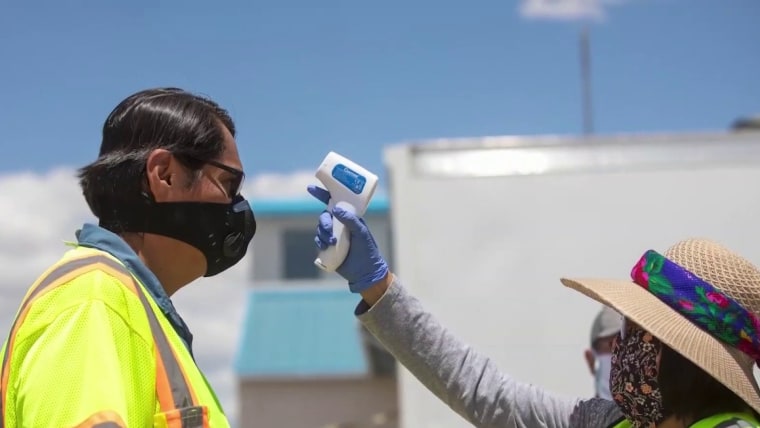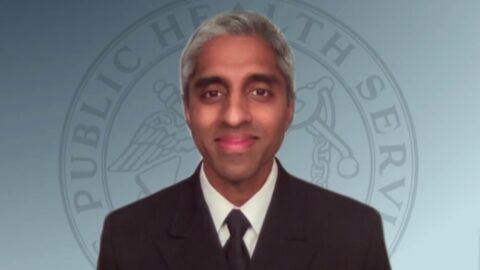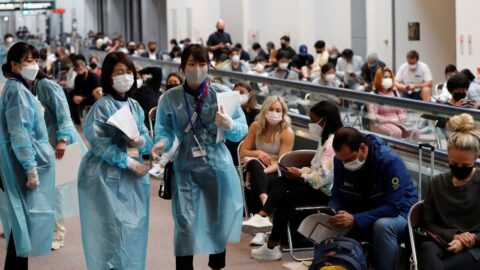Compared to vaccination, Covid-19 itself is far more likely to lead to heart problems in teenage boys and young men, the Centers for Disease Control and Prevention reported Friday.
The study is the first to compare directly the odds of a type of heart inflammation called myocarditis following an infection versus vaccination — providing a clearer understanding of the real risk for heart problems and perhaps offering comfort to parents and young men who have had questions about the risks and benefits of the vaccine.
Full coverage of the Covid-19 pandemic
Myocarditis has long been linked to a variety of viruses, including influenza and coxsackieviruses. The condition was identified as a potential side effect of mRNA Covid vaccines in young people last summer.
At that time, the CDC found that myocarditis cases were more than double what would normally be expected among males in their teens and early 20s who had been vaccinated. While both the Moderna and the Pfizer-BioNTech vaccines have been linked to the problem, Pfizer’s shot is the only one authorized for people under age 18.
Most cases of vaccine-related myocarditis got better without any lasting issues, but the reports left many parents concerned, wondering whether the potential heart risks from Covid vaccines in young men are greater than their benefit.
The new data, doctors say, answer that question with a resounding no. It confirms what pediatric cardiologists have long noted in their patients: Heart problems are far more likely to occur as a result of Covid than after the vaccines.
“It absolutely mirrors what we’ve seen here,” Dr. Gerard Boyle, medical director of the Pediatric Heart Failure and Transplant Services at Cleveland Clinic Children’s Hospital, said of the new findings.
“The number of patients that have come in with post-infection myocarditis have been much more numerous than the patients that have come in with post-vaccination myocarditis — without question,” he said.
In the study, researchers analyzed electronic health records of more than 15 million people in 40 health care systems nationwide, collected from January 2021 through the end of January 2022, looking for evidence of heart inflammation or multisystem inflammatory syndrome in children. MIS-C causes inflammation around several organs, including the heart.
Overall, heart problems related to either the infection or the vaccines were rare.
Rates of vaccine-related myocarditis, though uncommon, were highest for boys, ages 12 to 17, particularly after their second dose of vaccine.
But even within this group, the risk for heart issues was up to 5.6 times higher after contracting Covid, compared with vaccination.
“These complications are quite rare,” said Dr. Matthew Oster, a medical officer at the CDC’s National Center on Birth Defects and Developmental Disabilities and an author of the new report. “But if your question is, is my child more at risk from having heart problems from getting Covid or from getting the vaccine, the answer is they’re more at risk of getting heart problems from Covid.”
Oster is also a pediatric cardiologist with Children’s Healthcare of Atlanta.
Common symptoms of myocarditis include chest pain and shortness of breath. Pediatric cardiologists overwhelmingly said that there is no indication that young athletes are at any greater risk for myocarditis than others.
Download the NBC News app for full coverage of the Covid-19 outbreak
To reduce the risk for potential heart problems following vaccination, the CDC recently advised widening the gap between the first and the second doses of mRNA vaccines to eight weeks. The move came after health experts in Canada determined that the rates of myocarditis fell significantly when the doses were separated by this interval, rather than three to four.
The change makes sense to researchers such as Dr. Buddy Creech, a pediatric infectious disease expert at the Vanderbilt University Medical Center in Nashville, Tennessee.
Creech, who is a principal investigator for the Moderna KidCOVE clinical trials, explained that vaccine side effects may be more likely to occur when doses are too close to each other.
“It’s a real specific risk window,” he said. “We think that what happens is there’s such an immune response to the vaccine in those hours and days following the second vaccine, that it triggers a stress reaction in the heart.” The body is on high alert during this time.
But giving the immune system more time to build strong and lasting responses may be the key to reducing risks of side effects, he said.
“If you’re giving a second dose three or four weeks later, you are at a point immunologically where you have a lot of antibody from that first dose, and now you’re giving a lot of the antigen with the vaccine,” Creech said.
The new data come as Covid vaccinations have largely lagged among teenagers. According to the American Academy of Pediatrics, 14.4 million children ages 12 to 17 have had two doses of vaccine, representing just over half of kids in this age group.
“I think people are still hesitant” to get their kids vaccinated, said Dr. Stuart Berger, a pediatric cardiologist at Lurie Children’s Hospital of Chicago. “But now we have real, hard data that we can provide them with.”
Follow NBC HEALTH on Twitter & Facebook.










Recent Comments